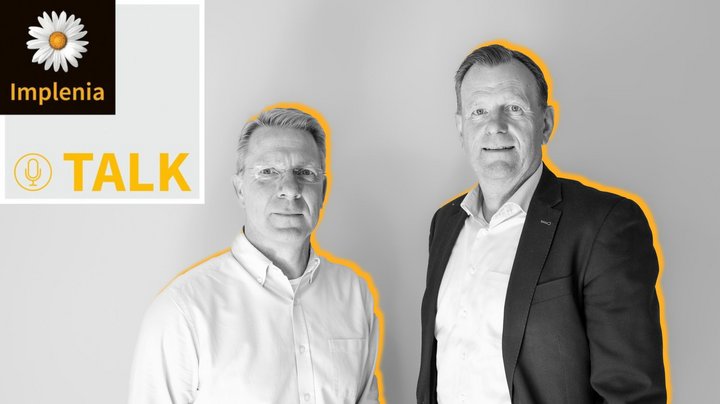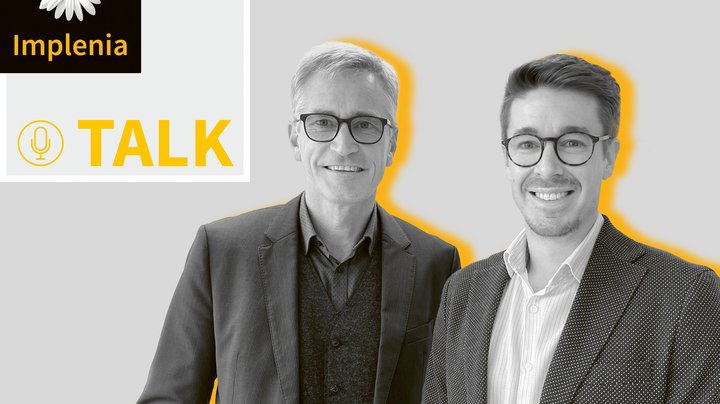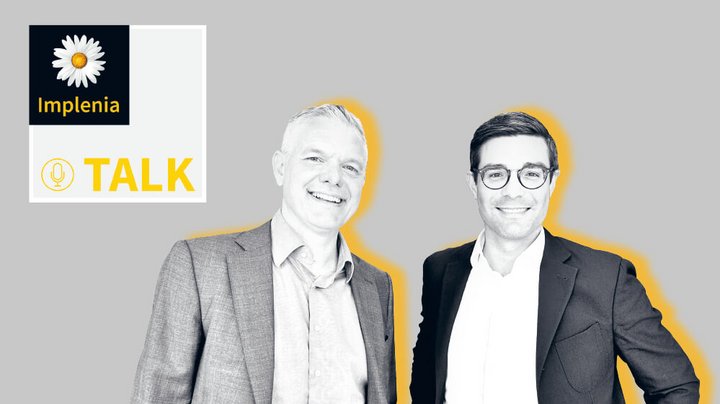Implenia Talk: Hur går resan, Erwin?

ABSTRACT TILL PODCAST
I den här podcasten pratar Eva Heimrich, chef för Corporate Communications på Implenia, med Erwin Scherer, den nya chefen för Implenias avdelning för civilingenjörsteknik, om hans yrkesresa, ledarskapsprinciper och utmaningarna inom byggnadsbranschen.
- Sedan den 1 september 2024 har Erwin Scherer tagit över ledarskapet för avdelningen för civilingenjörsteknik och ansvarar för över 4 800 anställda i sex länder. I detta avsnitt presenterar han sig själv och ger en inblick i sin karriärväg, som präglats av hans passion för resor, hans studier i Subsurface Engineering och hans omfattande internationella projektupplevelse (0:30 Min.).
- Erwin Scherer har arbetat med betydande infrastrukturprojekt utomlands, inklusive dräneringssystem i Singapore och tunnelbanan i Köpenhamn. En av de mest formativa erfarenheterna för honom var järnvägsprojektet Sankt Anton am Arlberg i Österrike, som bjöd på unika utmaningar (5:00 Min.).
- Ett centralt ämne i samtalet är ledarskapsstilen på Implenia. Scherer betonar vikten av förtroende, öppenhet och ett motiverat team som grunden för ett framgångsrikt samarbete. Han förklarar varför han inte försöker leda genom kontroll och hur han tillämpar denna filosofi i sin nya roll (9:00 Min.).
- Ett annat fokus i samtalet är de nuvarande och framtida möjligheterna och utmaningarna inom civilingenjörsteknik, inklusive digitalisering, urbanisering och nya kontraktsmodeller. Implenia är väl positionerat för att möta dessa krav och fokuserar på integrerad projektledning för att hantera framtida utmaningar (10:00 Min.).
- Visionen för avdelningen för civilingenjörsteknik utforskas också. Avdelningens framgång bygger på teamwork och alla anställdas kollektiva engagemang. Scherer betonar att framgångsrik genomförande av större projekt alltid är resultatet av en stark enighet och gemensamma ansträngningar (11:30 Min.).
Obs: Den här podcasten spelades in på tyska. Andra språkversioner finns tillgängliga här: Tysk Franska
«I am anything but someone who tries to lead through control – trust is my foundation.»
Erwin Scherer
TRANSCRIPT
Eva Heimrich: Welcome to Implenia Talk! In this podcast format, we explore topics and developments that shape our working environment at Switzerland’s largest construction and real estate service provider, and we give our employees a direct voice. I am Eva Heimrich, Head of Corporate Communications, and I will guide you through this episode.
Today, I am pleased to welcome Erwin Scherer, who has been heading Implenia’s Civil Engineering Division since September 1, 2024, managing over 4,800 employees in six countries. Erwin has been responsible for the tunneling division for five years and has now succeeded Christian Späth. He knows Implenia very well, with all its strengths and challenges. Today, we want to learn from him what has shaped his life and career, what is important to him in teamwork, and what challenges he is looking forward to in his new role.
Erwin, you took over as head of Implenia's Civil Engineering Division at the beginning of September – with around 4,800 employees across six countries. Could you briefly introduce yourself for those who don’t know you? Where are you from? What is your educational background? What does your career path look like, and when did you join Implenia in your current role?
Erwin Scherer: Yes, I’d be happy to! As you already know, my name is Erwin Scherer. I’m Austrian, born in 1966 in Salzburg. More precisely, I was born in the state of Salzburg, where I also graduated from high school – in Austria, it’s called the same as in Switzerland, the Matura or Abitur – and then, as was mandatory for everyone back then, I joined the military. I followed the call of the state, first completing my voluntary service and then training as a reserve officer.
Afterward, I decided not to go straight to university. Although that had always been my goal, I wanted to do something different first. I was 20 years old, and my desire to see the world was strong. So, that’s what I did. I travelled the world for almost two years – not continuously, but with breaks. I was constantly on the move: working various jobs, interrupting the travels, returning to Europe to earn money, and then setting out again for the next journey. I started in Oceania, Australia, New Zealand, and the South Pacific. However, due to a lack of funds, I had to cut my trip short in India and return to Austria to earn more money. I then ventured to Central America and eventually spent a long time in Africa. It wasn’t always easy, but I had a travel-experienced friend with me, and all in all, it was a fantastic experience. When you’re in your early twenties, the word ‘risk’ doesn’t carry much weight – it’s the perfect mindset.
But after two years, it was over. To be honest, my parents also applied a bit of pressure: ‘How much longer will this go on, my dear boy?’ So, I said: ‘Okay, I’m ready to study now,’ and I began my studies at Montanuniversität Leoben in Styria. There, they offered a department under the English name Subsurface Engineering. This name was shaped by our partner university, the Colorado School of Mines, with whom we had a joint master’s program. So, I wasn’t a traditional Diplom-Ingenieur but one of the first master’s graduates in the German-speaking region. That wasn’t bad at all.
I completed my studies in 1995, moved to Vienna, and started working at a company called Stuag. This company was later acquired by Strabag, which is why I continued living in Vienna but was working in Germany. That went very well for three or four years until I separated from my then-girlfriend and moved to Wiesbaden in 1998, where I still live today. There, I met my current wife, with whom I will celebrate 25 years of marriage in December, and we have four daughters together. After that, I moved to Züblin in Stuttgart, and five years ago, I took on the challenge of joining Implenia as Head of Tunneling.
Eva Heimrich: Can you tell us where and on what projects you worked abroad?
Erwin Scherer: In Europe, I worked for my former company in Portugal, in Copenhagen in Scandinavia, briefly in Israel, and for a longer period in Southeast Asia, particularly in Hong Kong and Singapore.
Eva Heimrich: And what did you do there?
Erwin Scherer: I was involved in several infrastructure projects in Singapore, such as the drainage of the city-state, similar to my work in Israel on the 5th Water Line to Jerusalem and the metro in Copenhagen.
Eva Heimrich: Very interesting! We’re already discussing your projects. Are there any specific ones that have left a lasting impression on you?
Erwin Scherer: There are many projects I remember positively, but also some that – after such a long time – I remember less fondly. One that truly shaped me was shortly after I started my career in 1999: the major project in Sankt Anton am Arlberg in Austria. Some may know it from skiing. Back then, the goal was to relocate the railway, which ran through the town, to the other side of the valley, underground, in time for the 2001 Ski World Championships. I was the project manager on-site. That winter, in Tyrol, specifically in Galtür, there were these massive snowfalls that triggered catastrophic avalanches. It left a strong impression on me because the office and the construction had to be evacuated seven times by mountain rescue teams. Seven times in one winter. That was tough, but it’s something that stays with you.
Eva Heimrich: For the past five years, you’ve been Head of Tunneling at Implenia. Even in your new role, you continue to hold this position. What fascinates and motivates you about it?
Erwin Scherer: When Christian Späth called me five years ago, followed by René Kotacka, who hired me together with André Wyss, they asked me the same question: ‘Why are you joining Implenia? You’re in a good position at Züblin.’ I was simply looking for a challenge. I wanted a change. Implenia is different from a more traditional and conservative company like Züblin, particularly in terms of the leadership team. That intrigued me. Additionally, Implenia’s headquarters is in Switzerland, which meant that I wouldn’t have to endure those exhausting long-haul flights to Asia every two weeks. That was very demanding.
Implenia’s operations in Europe meant that, for someone like me, who was used to flying abroad frequently, such as to the USA, most trips now involved short two-to-three-hour flights. So, this smaller market was quite interesting for me. That’s what drew me to Implenia. And what sets Implenia apart from other construction companies is the composition of its management team. It’s not just made up of people who learned civil engineering from the ground up; it’s a diverse group of individuals. That’s what makes it exciting, and that’s what attracted me.
Eva Heimrich: Wonderful. So, diversity and variety are qualities that you appreciate?
Erwin Scherer: Yes, absolutely. That’s the way forward, and I think it works well.
Eva Heimrich: What values or principles are particularly important to you, both professionally and personally? How do you manage your teams?
Erwin Scherer: I foster an open leadership style, open communication, and honest exchanges. I am anything but someone who tries to lead through control – trust is my foundation. I believe that you can achieve much more with trust-based collaboration. I can’t control everything anyway; things are just too complex. But if you can hire the right people who are motivated and passionate about their work, it’s much more effective. Nevertheless, we are a business, and we’re here to make money – we owe that to our stakeholders. Sometimes, tough decisions need to be made. There’s no way around that, but it doesn’t change my leadership style.
Eva Heimrich: Let’s talk a bit more about the market: In your view, what are the biggest opportunities and challenges in civil engineering that lie ahead?
Erwin Scherer: The well-known topic of digitalisation has already reached us. Long ago, but there’s more to come. I believe André Wyss has often said it: the trend toward urbanisation will continue. More and more people are moving to cities, and large urban centres are emerging. We can no longer manage without a healthy and well-functioning infrastructure. Over the past few years, we’ve positioned ourselves well as the Civil Engineering Division, along with our subsidiaries in tunneling, deep foundation engineering, and structural engineering. We see great opportunities here because we are already well-prepared for these large-scale projects with our technical offices. That will be key.
Another interesting development that began a few years ago is new contract models. Part of our job is to recognize that working against each other is less productive than working together. It costs money, it drains energy, and it wears people down – and especially young people no longer want that. Rightly so, I must say. We’re currently experiencing a phase of transformation, and we’re all challenged. Personally, I see it as an opportunity. We have the right people for this process, and I see us well-positioned for the future.
Eva Heimrich: What do you expect from your team to lead the division toward a successful future?
Erwin Scherer: We approach this together as a team. The strategy we’ve committed to – our vision, our purpose, our mission, and the way we approach things – is not just my work or the work of a few people. If you know how to build infrastructure, you know that it’s always a collective effort.
It takes many people acting in unison and sharing the same interest. That’s how even large, complex projects can be tackled, turned around, and completed successfully. I’m convinced of that. Of course, you need people who are committed and pulling in the same direction. Then, you can take on the challenge. I’m optimistic about the future, Eva.
Eva Heimrich: Wonderful! Now that you’ve taken over the entire division, do you have a vision for it, and how do you intend to implement it?"
Erwin Scherer: We began integrated execution of large projects some time ago. There’s still room for improvement: the cost centre mentality, where each unit looks out for itself, is still somewhat ingrained. This is understandable because it’s tied to the compensation model. We need to improve a bit in this area and truly say, ‘Okay, I care about the project and also the success of the joint departments, for Implenia’s benefit.’ We’re working on that, and we’re getting better. There’s still room for improvement, and we’re working on it together. We’re not done yet, and we can still do better.
Eva Heimrich: You work a lot and travel frequently for business. What do you do in your free time to find a balance with these challenges?
Erwin Scherer: I try to exercise two or three times a week. Admittedly, not as intensely or quickly as before, but I still manage to work out for an hour two or three times a week. When I’m traveling, I sometimes use the treadmill in the hotel, and on weekends, I like to get outdoors and stay active. I also play tennis actively in a club, which I enjoy, and as a native Austrian, I go skiing whenever I can in the winter.
A hidden passion of mine, which not many people know about, is golf. But that has to wait for now due to time constraints. Maybe in five years or later, we’ll see. But that’s my way of finding balance. And of course, I enjoy spending time at home with my family.
Eva Heimrich: We’ve come to the end of our conversation. I’d like to thank my guest, Erwin Scherer. Erwin, I wish you great success in this new, significant role and all the best!
Erwin Scherer: Thank you, Eva. It was my pleasure, and until next time.
Gillade du podcasten? Har du förslag eller ämnen du vill att vi ska ta upp? Skriv till oss på: redaktion@implenia.com
Vi ser fram emot en spännande utbyte och kommer att hålla oss uppdaterade om de ämnen som betyder något för dig. Till nästa gång!





